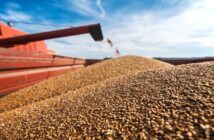The National Association of Agricultural Contractors (NAAC) mobile seed processors are taking a responsible approach to erucic acid testing in oil seed rape, continuing to encourage growers to test seed before farm saving. This comes after an NAAC pilot scheme in 2018, which highlighted a minority of seed samples intended for farm saving that had a high level of erucic acid; the results of which allowed growers to take informed decisions on whether or not to go ahead with processing and drilling, helping to minimise the risk of any additional financial penalty in the marketed crop.
The presence of high erucic acid levels in double zero varieties continues to cause problems for growers and crushers of oilseed rape. There are a number of possible reasons for this including previously having grown HEAR, weed contamination and possible links to levels in seed. Whilst it is not a safety concern for most consumers, oilseed rape contracts stipulate a maximum of 2% erucic acid and, currently, loads are rejected over 5%, with those between 2% and 5% incurring price penalties. There also remains an imminent threat that the European Commission may tighten up food standard to a maximum 2%, so it is important that farmers and seed processors get this problem under control and it is acknowledged that not testing seed batches prior to farm saving may exacerbate the problem.
In 2018 NAAC mobile seed processors encouraged growers to test oil seed rape before saving, with some achieving a 100% level of erucic acid testing. This voluntary testing scheme is to be extended into 2019, aiming to get all seed tested before farm saving to help growers tackle and stamp out the problem.
The NAAC has also published guidance on farm saving oil seed rape, in partnership with the NFU, which is available at www.naac.co.uk/industry-information/. The guidance highlights further the importance of testing and advises growers on growing, managing and testing seed prior to farm saving.
Commenting, Robert White, NAAC Mobile Seed Vice-Chairman said, ‘Mobile seed processors see themselves as part of the solution to this problem – helping their customers make well informed business decisions. Our growers will not thank us if we don’t highlight any potential issues at an early stage. It might cost us a contract or two but we must take a long term view that what is good for our customers will ultimately be better for us.’
Testing for erucic acid is now common and usually costs around £50-£60 per test and results are back within a week. Mobile seed processors will be able to offer and organise the testing service so that growers can make an educated decision from a position of knowledge. Farm saving oil seed rape is still a very cost-effective method of getting quality seed in the ground and testing for erucic acid should be viewed as a positive way of ensuring good crop management.




